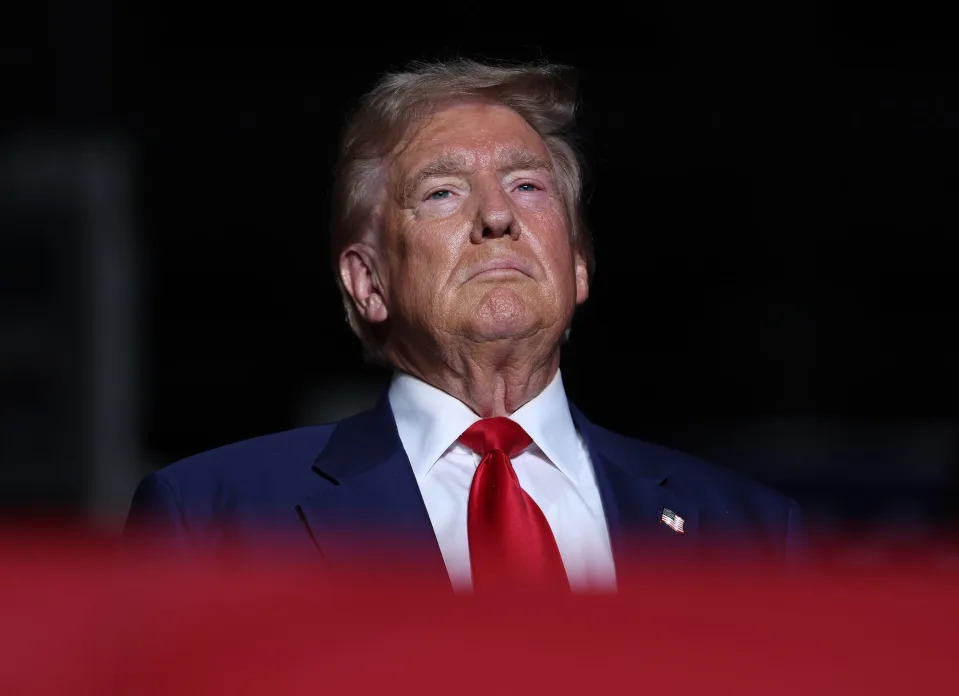News
How Trump's latest tariff plans are roiling global markets

President-elect Donald Trump's latest plans to levy tariffs against China, Mexico, and Canada were moving markets on Tuesday.
In two posts on Truth Social on Monday evening, Trump said he would impose a 25% tariff on all products coming into the United States from Canada and Mexico and an additional 10% tariff on imports from China.
"On January 20th, as one of my many first Executive Orders, I will sign all necessary documents to charge Mexico and Canada a 25% Tariff on ALL products coming into the United States, and its ridiculous Open Borders," Trump said.
According to the International Trade Administration, the top three suppliers of US goods imports in 2023 were Mexico, at $475 billion, China, at $427 billion, and Canada, at $419 billion.
While the US stock market traded mostly higher on Tuesday following a brief sell-off on Monday evening, other global markets were more heavily affected by the news of Trump's plans.
Here are three sectors of global markets moving on Trump's latest tariff proposals.
Currency moves
The Canadian dollar declined by as much as 1.4% versus the US dollar, while the Mexican peso plunged by as much as 2.1% relative to the US currency.
The threat of tariffs has led to a dollar rally since the election on the expectation that the Federal Reserve will have to keep rates high to counter tariffs' inflationary effect.
Higher US rates lead to a stronger greenback as foreign investors buy up dollars to invest in relatively higher-yielding assets like Treasury bonds and other debt securities.
The US Dollar Index, which measures the dollar against a basket of major currencies, was up slightly on Tuesday morning, to about 106.97.
Global stocks
While US shares were somewhat muted in their reaction, global stocks were rattled.
Mexico's and Canada's stock markets declined in Tuesday trading. The iShares MSCI Mexico ETF fell by as much as 3%, while the iShares MSCI Canada ETF declined by about 1%.
In Europe, the Stoxx 600 index fell by 0.5%. Japan's benchmark Nikkei 225 was down by almost 1%, and South Korea's KOSPI fell by 0.6%.
China's stock market, though, was down by just about 0.5%. While Trump's plans for tariffs on goods from Mexico and Canada surprised investors, commentators say the market has already digested the threat of tariffs against China. Trump's Truth Social post was also somewhat unclear, alluding to 10% "above any additional tariffs." Trump had campaigned on a 60% tariff on goods from China.
Automakers led the move lower in US and international stock markets, as many companies have moved production to Mexico in recent years.
Volkswagen shares declined by about 2%, while Nissan stock dropped by as much as 6%. Stellantis shares fell by 4.6%.
In the US, Ford shares fell by 2%, and GM was down by almost 7%.
Commodities
Canadian oil prices took a hit on the news.
Oil is among Canada's top exports to the US, which imported $97.1 billion worth of crude from the country in 2023. Canadian heavy crude from the country's oil sands is a top source of oil for Gulf Coast refineries, especially as US sanctions restrict flows from other countries.
Western Canadian Select crude was down by nearly 4% on Tuesday, to $57.04 a barrel.
Assessing the threat
Capital Economics said Trump's new tariff threat could simply be a negotiating tool.
In a note on Tuesday, the economist Stephen Brown said the tariffs were "designed to extract concessions on drug trafficking and illegal border crossings, which means it may be possible for the countries targeted to head them off."
Brown added: "The implication seems to be that the countries could avoid these tariffs by presenting credible plans to take action to reduce drug supply or secure their borders, much like how Mexico staved off a similar threat from Trump in 2019."
Ultimately, he added, it's in the countries' best interest to work with Trump by "pledging cooperation, rather than threats of retaliation."
Canadian Prime Minister Justin Trudeau appeared to be sticking to that playbook, saying on Parliament Hill on Tuesday morning that he had a "good call" with Trump after the tariff threats.
"We obviously talked about laying out the facts, talking about how the intense and effective connections between our two countries flow back and forth," Trudeau said.
Market commentators also described it as likely a negotiating tactic by Trump, as sweeping tariffs against America's biggest trading partners would most likely fuel a rebound in inflation .
Dave Grecsek, a managing director at Aspiriant, told Business Insider that a one-time impact from the proposed tariffs "could add 0.5% to 1% to core inflation in 2025."
Interest rates moved slightly higher on the tariff plans, with the 10-year Treasury yield rising by about 4 basis points, to 4.32%.
"Not the end of the world, but with aggregate prices already 20% to 30% higher than pre-pandemic, it certainly wouldn't be a welcome development," Grecsek said of the tariffs.
Read the original article on Business Insider

